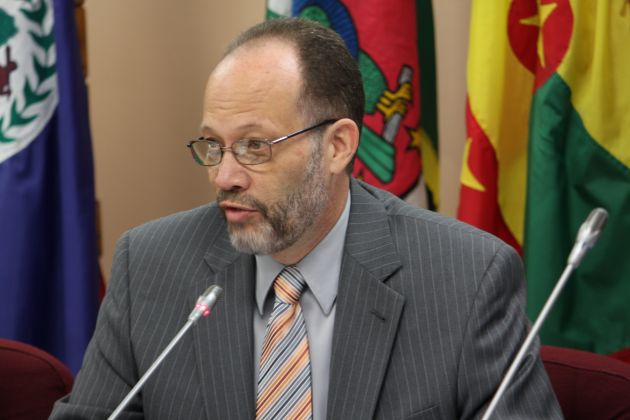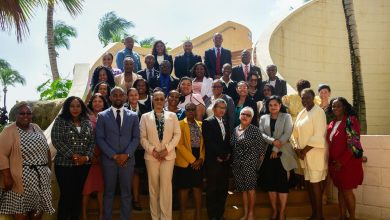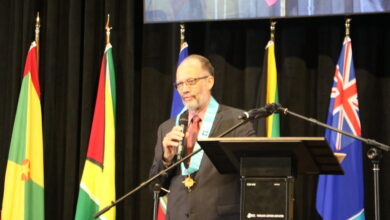It is indeed a pleasure to welcome you to this Meeting of the Council for Human and Social Development (COHSOD) and to the CARICOM Secretariat Headquarters. I wish to welcome, in particular, those Ministers participating in this Council for the first time.
This Meeting of the COHSOD comes at a time when, at the national level, we are assessing the achievements of the Millennium Development Goals and the Beijing Platform for Action. As a Region, we are seeking to define and position CARICOM priorities within the new global framework for the Post-2015 Development Agenda, the SIDS Agenda and the Beijing+20 Agenda.
It also coincides with a period in which the Community has been engaged in strategic planning to determine our priorities for the immediate future and position our Region to build the resilience so necessary to withstand the various challenges which we confront. Many of you might have been engaged in the National Consultations held throughout the Region with regard to the development of the Community’s first ever Five-Year Strategic Plan. This Plan is now in the process of being finalised and should be presented to the Conference of Heads of Government at its Thirty-Fifth Regular Meeting in July.
In considering the strategic directions for our Community, the issue of prioritisation is critical and the COHSOD, like all the other Ministerial Councils, must determine which of its several issues of specific concern it wishes to prioritise.
Without doubt, one of these relates to Youth Development. The situation of youth unemployment has reached unprecedented proportions globally and our Region is no exception. The 2012 ILO Report – The Youth Employment Crisis: Time for Action highlights the serious long-term implications of this situation when it points out that ‘The current youth employment crisis is undermining belief in the norm that each successive generation will see improvements in its employment and economic prospects. It is also threatening the principle of equality of opportunity across generations’. The Report also highlights the threat which this situation poses with regard to the growing gap in inequality within the current cohort of youth.
In our Region, there is significant unemployment and under employment existing alongside acute skill shortages in some key sectors of our economies. The lack of access to technology by many of our young people has the potential to widen both the employment and poverty gaps, and this needs to be addressed. In addressing this issue, this Council will have to take into account the need to ensure that our human capacity development becomes more relevant to our society’s needs in the context of the priorities established within the Strategic Plan. There should also be the recognition of the imperative to engage our youth in ways which will use their innate creativity to contribute to their own development and prospects for employment.
The ease with which this generation has adapted to the digital age, along with their creativity, provides opportunities for our youth and a platform for our Region to take advantage of the untapped potential within the Information and Communications Technology (ICT) sector and in the creative industries. ICT is opening up new vistas and we need to ensure that the Community is well placed to fulfill the potential it offers for employment and entrepreneurship. Our Heads of Government are seized of the opportunities for ICT to be the new frontier for regional integration and have outlined a programme for its development, including the creation of a Single ICT space and the use of ICTs to engender economic growth and social development.
Honourable Ministers, your Agenda reflects the importance of ICT in helping to achieve a key social and economic goal – decent work. At the Tripartite Caribbean Employment Forum, held in Barbados in 2006, CARICOM Member States and Associate Members, together with the leaders of employers’ and workers’ organisations, adopted a Tripartite Declaration and Plan of Action for realising the Decent Work Agenda in the Caribbean. Decent Work is an important focus given its central role in alleviating poverty, and we recognize that despite progress there are many gaps. Women and youth in particular continue to be at a disadvantage in terms of the jobs available to them, their remuneration, benefits and working conditions, and access to decision-making positions.
In thanking the International Labour Organisation (ILO), for its assistance to the tripartite constituents in support of its promotion of Decent Work as an overall sustainable development objective, I also wish to express appreciation for the critical support which it continues to provide to the Region in all other labour related issues.
Mr. Chairman, Honourable Ministers, we have established the legal and institutional arrangements for the CSME, but there remains some issues to be addressed. These include a Labour Market Information System which would provide a foundation for effective deployment of skills under the CSME. This would serve to alleviate the situation in which there may be a surplus in specific skills in some Member States which are needed in others.
We must also move to ensure the ability of women and men to participate equally and equitably in all aspects of life under the CSME. The recommendations of this Meeting, based on the study on the Gender Impact of the CSME, undertaken under the Canadian-funded CARICOM Trade and Competitiveness Project will be crucial to advancing gender equality in this regard. I would like to thank the Government of Canada for its support which also includes providing assistance within the Secretariat to deal with gender issues.
The issue of gender equality resonates across the globe and I also wish to acknowledge the role of UN Women in assisting the Community to engage fully in the discussions on that issue at the global, regional and national levels with respect to, in particular, the Post 2015 Development Agenda and the SIDS Agenda.
Ladies and Gentlemen, the integrated focus of this Meeting on Labour and Gender Issues is very significant. Governments and other stakeholders, including the private sector, have an important role to play in promoting and advancing policy coherence through the integration of Labour and Gender issues in all aspects of our Development Agenda. The deliberations and recommendations of this Council over the next two days can provide guidance in this regard and, in so doing, make a contribution to the economic and social development of our Region. I look forward eagerly to your discussions.
I thank you






